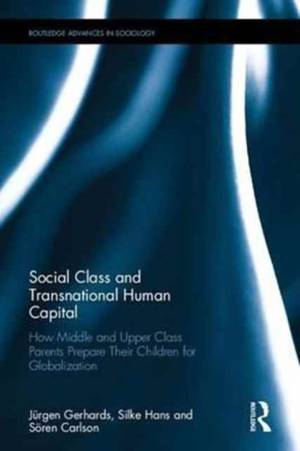
- Afhalen na 1 uur in een winkel met voorraad
- Gratis thuislevering in België vanaf € 30
- Ruim aanbod met 7 miljoen producten
- Afhalen na 1 uur in een winkel met voorraad
- Gratis thuislevering in België vanaf € 30
- Ruim aanbod met 7 miljoen producten
Social Class and Transnational Human Capital
How Middle and Upper Class Parents Prepare Their Children for Globalization
Jürgen Gerhards, Hans Silke, Sören CarlsonOmschrijving
Due to globalization processes, foreign language skills, knowledge about other countries and intercultural competences have increasingly become important for societies and people's social positions. Previous research on social inequality, however, has dominantly focused on the reproduction of class structures within the boundaries of a particular nation-state without considering the importance of these specific skills and competences.
Within Social Class and Transnational Human Capital authors Gerhards, Hans and Carlson refer to these skills as 'transnational human capital' and ask to what extent access to this increasingly sought-after resource depends on social class. Based on Pierre Bourdieu's theory of class, they investigate this question via both quantitative and qualitative empirical analyses. In doing so the authors focus, among other examples, on the so-called school year abroad, i.e. students spending up to a year abroad while attending school - a practice which is rather popular in Germany, but also quite common in many other countries. Thus, this insightful volume explores how inequalities in the acquisition of transnational human capital and new forms of social distinction are produced within families, depending on their class position and the educational strategies parents pursue when trying to prepare their children for a globalizing world.
An enlightening title, this book will appeal to undergraduate and postgraduate students, as well as postdoctoral researchers interested in fields such as sociology, social inequality research, globalization studies and educational studies.
Specificaties
Betrokkenen
- Auteur(s):
- Uitgeverij:
Inhoud
- Aantal bladzijden:
- 216
- Taal:
- Engels
- Reeks:
Eigenschappen
- Productcode (EAN):
- 9781138232020
- Verschijningsdatum:
- 1/06/2017
- Uitvoering:
- Hardcover
- Formaat:
- Genaaid
- Afmetingen:
- 156 mm x 233 mm
- Gewicht:
- 559 g

Alleen bij Standaard Boekhandel
Beoordelingen
We publiceren alleen reviews die voldoen aan de voorwaarden voor reviews. Bekijk onze voorwaarden voor reviews.











